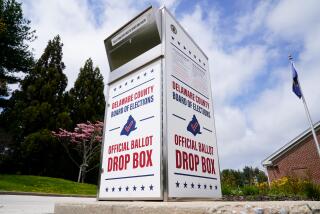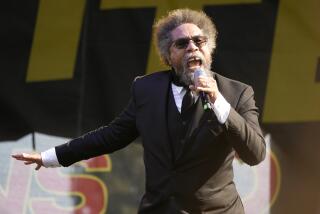Parties Bankroll Get-Out-the-Vote Efforts
- Share via
Republican Party leaders say they will raise an unprecedented $100 million to mobilize voters for the November general election with a mix of television and radio advertising, direct mail, phone banks and door-to-door politicking.
The effort, which Democrats plan to combat with a multimillion-dollar organization drive of their own, marks a bid by the GOP to bolster its in-house turnout operation after years of counting on groups such as the Christian Coalition and the National Rifle Assn. to mobilize the conservative base. It represents a staggering 50% jump over the party’s spending in 1996, GOP leaders said.
Fred Meyer, a former chairman of the Texas Republican Party and a friend of nominee George W. Bush, said the shift is modeled on an effort in Bush’s 1994 run for Texas governor. In that race, strategist Karl Rove worked to identify swing voters and had the campaign pursue them with phone calls, mail and door-to-door visits. The combined effort raised turnout about 14%, Meyer said.
Compelling registered voters to show up at the polls on election day is key in any campaign but particularly in this year’s White House race, where the outcome could turn on a sliver of the electorate.
The Democratic Party, which so far has outspent the GOP on television advertising, plans to spend about half the Republican amount on mobilization. In part, the Democrats will be relying on such organizations as the AFL-CIO and the Sierra Club to propel their Democratic-leaning and independent members to the polls to back Vice President Al Gore.
In previous election cycles, the GOP has relied more heavily on grass-roots groups and its state party leaders in determining how to turn out voters, said Terry Holt, a spokesman for the mobilization effort, called Victory 2000. This year, Republican leaders in Washington are sending out their own staff to work alongside state party strategists.
“In the last three election cycles, this [national] component has been somewhat less important,” Holt said. “What we’re doing this time represents a significant shift back to having an aggressive ground game.”
The most visible sign of the effort so far is the party’s air war, including one television commercial that began airing Tuesday in 17 states, but not California. GOP officials said the party would spend $3.7 million to run the ad this week. In the ad, an announcer says, “While George Bush offers a positive issue agenda, more negative attacks from Al Gore. The truth? George Bush is cleaning up Texas.” The spot also attacks Gore for allowing zinc mining on his personal property.
About one-third of the Republicans’ mobilization money, however, would be spent on TV and radio spots. Another third is earmarked for phone banks, polls and mailings geared toward identifying and swaying independent voters in competitive states. And $13.7 million is reserved for paying administrative costs for the Bush campaign. Federal law restricts the use of party money in the presidential campaigns, but Holt said the funds can legally be used to pay the costs of operations for “ticketwide projects,” such as booking surrogates on news broadcasts to trumpet GOP themes.
Union organizers preparing to help Democrats said their effort is gearing up.
Steven Rosenthal, the political director of the AFL-CIO, said he has been building a network of organizers who will target 71 congressional districts in 25 states. In contrast, he said the Republican effort would emphasize heavy spending on paid communication instead of door-knocking and personal lobbying.
“Politics has become so impersonal . . . that most voters have nowhere to go to talk one on one,” Rosenthal said. “To some extent we filled the void over the last couple of years. I think [the GOP] is just using slick campaign mail or paid phone banks. It isn’t going to make up for the neighborly one on one.”
More to Read
Get the L.A. Times Politics newsletter
Deeply reported insights into legislation, politics and policy from Sacramento, Washington and beyond. In your inbox twice per week.
You may occasionally receive promotional content from the Los Angeles Times.










